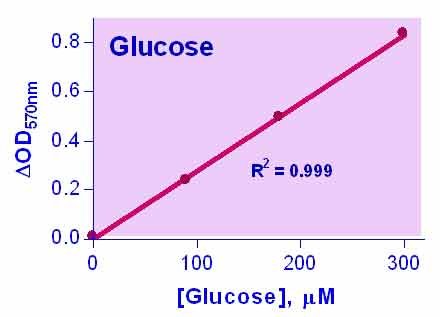EnzyChrom™ Glucose Assay Kit
Application
- For quantitative determination of glucose and evaluation of drug effects on glucose metabolism.
Key Features
- Sensitive and accurate. Use as little as 20 µL samples. Linear detection range in 96-well plate: 5 to 300 µM (90 µg/dL to 5.4 mg/dL) glucose for colorimetric assays and 1 to 30 µM for fluorimetric assays.
- Simple and high-throughput. The procedure involves addition of a single working reagent and incubation for 30 min at room temperature.
Method
- OD570nm, or FL530/585nm
Samples
- Serum, plasma, urine, saliva, milk, culture medium, food, agriculture etc
Species
- All
Procedure
- 40 min
Size
- 100 tests
Detection Limit
- 5 µM
Shelf Life
- 6 months
More Details
Glucose (C6H12O6) is a key diagnostic parameter for many metabolic disorders. Increased glucose levels have been associated with diabetes mellitus, hyperactivity of thyroid, pituitary and adrenal glands. Decreased levels are found in insulin secreting tumors, myxedema, hypopituitarism and hypoadrenalism. Simple, direct and high-throughput assays for measuring glucose concentrations find wide applications in research and drug discovery. BioAssay Systems glucose assay kit uses a single Working Reagent that combines the glucose oxidase reaction and color reaction in one step. The color intensity of the reaction product at 570nm or fluorescence intensity at λex/em = 530/585nm is directly proportional to glucose concentration in the sample.What are the differences between the three EnzyChrom Glucose assay kits?
EBGL – best at detecting low levels of glucose (as low as 5 µM)
EGL2 – best at measuring high levels of glucose using a low wavelength filter (340 nm)
EGL3 – best at measuring high levels of glucose using a high wavelength filter (565 nm)
Which of the three EnzyChrom Glucose assay kits can be used with urine, saliva, or serum samples?
EBGL – Not recommended for urine, saliva, or serum samples
EGL2 – Compatible with urine and serum samples, not recommended for saliva samples
EGL3 – Recommended for urine, saliva, and serum samples
*Sample blanks are to be used when testing urine samples with EGL2 or EGL3
How specific is this assay (EBGL)?
Glucose oxidase is fairly specific for D-glucose and does not react with fructose, galactose, or xylose. It does react with the following sugars: 2-deoxy-D-glucose (11% relative activity compared to D-glucose), 4-o-methyl-D-glucose (7%) and mannose (3%).
Can this kit be used to measure glucose concentrations in cells?
Glucose is converted into glucose-6-phosphate within the cell, which may not react with our assay. We have not tested it, but if the concentration of free glucose in the cell is within the detection range (1 to 30 μM for fluorimetric assays) of the assay it could still work.
Lambert, K., et al (2021). Grape polyphenols and exercise training have distinct molecular effects on cardiac hypertrophy in a model of obese insulin-resistant rats. The Journal of Nutritional Biochemistry, 87, 108522. Assay: Glucose in rat blood.
Yohe, T. T., et al (2020). Metabolic and performance responses to the replacement of lactose by fat in milk replacer formulations for dairy calves. Animal: An International Journal of Animal Bioscience, 15(1), 100031. Assay: Glucose in cow serum.
de Carvalho, I. P. C., et al (2021). Increasing preweaning milk replacer supply affects postweaning energy metabolism of Holstein male calves. Animal: An International Journal of Animal Bioscience, 100170. Assay: Glucose in cow serum.
Jeong, S., et al (2021). High fructose drives the serine synthesis pathway in acute myeloid leukemic cells. Cell Metabolism, 33(1), 145-159.e6. Assay: Glucose in mouse cells.
Gulli, J., Kroll, E., & Rosenzweig, F. (2020). Encapsulation enhances protoplast fusant stability. Biotechnology and Bioengineering, 117(6), 1696-1709. Assay: Glucose in yeast media.
Edriss, H., et al (2020). Advanced glycation end products and glycosaminoglycans in patients with diabetic ketoacidosis. Journal of Investigative Medicine: The Official Publication of the American Federation for Clinical Research, 68(3), 738-742. Assay: Glucose in human serum.
Jager, Marianne, et al (2018). Inducible knockdown of endothelial protein tyrosine phosphatase-1B promotes neointima formation in obese mice by enhancing endothelial senescence. Antioxidants & redox signaling 30.7: 927-944. Assay: Glucose in mice serum.
Das, Champak, et al (2017). Multiplexed and fully automated detection of metabolic biomarkers using microdialysis probe. Sensors and Actuators B: Chemical 238: 633-640. Assay: Glucose in glucose.
He L et al (2014). Potential biomarker of metformin action. J Endocrinol. JOE-14-0084. Assay: Glucose in mice white bloold cell.
Klippel, S et al (2012). Methyljasmonate displays in vitro and in vivo activity against multiple myeloma cells. British Journal of Haematology, 159: 340-351. Assay: Glucose in cell line.
Drew BG, et al (2011). Reconstituted high-density lipoprotein infusion modulates fatty acid metabolism in patients with type 2 diabetes mellitus. J Lipid Res. 52(3):572-81. Assay: Glucose in human plasma.
Dhar A, et al (2010). Alagebrium attenuates acute methylglyoxal-induced glucose intolerance in Sprague-Dawley rats. Br J Pharmacol.159(1):166-75. Assay: Glucose in human plasma.
Cha SH et al (2008). Differential effects of central fructose and glucose on hypothalamic malonyl-CoA and food intake. PNAS 105(44):16871-5. Assay: Glucose in mouse blood.
Wolfgang MJ et al (2007). Regulation of hypothalamic malonyl-CoA by central glucose and leptin. PNAS 104(49):19285-90. Assay: Glucose in mouse blood.
Wolfgang MJ et al (2006). The brain-specific carnitine palmitoyltransferase-1c regulates energy homeostasis. PNAS 103(19):7282-7. Assay: Glucose in mouse plasma.
To find more recent publications, please click here.
If you or your labs do not have the equipment or scientists necessary to run this assay, BioAssay Systems can perform the service for you.
– Fast turnaround
– Quality data
– Low cost




